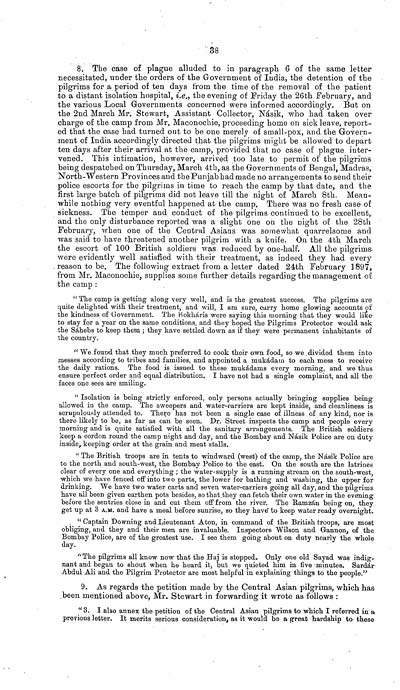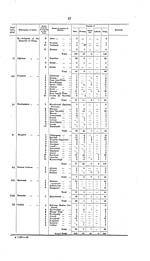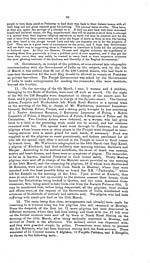Medicine - Disease > Account of plague administration in the Bombay Presidency from September 1896 till May 1897
(50) Page 38
Download files
Individual page:
Thumbnail gallery: Grid view | List view

38
8. The case of plague alluded to in paragraph 6 of the same letter
necessitated, under the orders of the Government of India, the detention of the
pilgrims for a period of ten days from the time of the removal of the patient
to a distant isolation hospital, i.e., the evening of Friday the 26th February, and
the various Local Governments concerned were informed accordingly. But on
the 2nd March Mr. Stewart, Assistant Collector, Nsik, who had taken over
charge of the camp from Mr. Maconochie, proceeding home on sick leave, report-
ed that the case had turned out to be one merely of small-pox, and. the Govern-
ment of India accordingly directed that the pilgrims might be allowed to depart
ten days after their arrival at the camp, provided that no case of plague inter-
vened. This intimation, however, arrived too late to permit of the pilgrims
being despatched on Thursday, March 4th, as the Governments of Bengal, Madras,
North-Western Provinces and the Punjab had made no arrangements to send their
police escorts for the pilgrims in time to reach the camp by that date, and the
first large batch of pilgrims did not leave till the night of March 8th, Mean-
while nothing very eventful happened at the camp. There was no fresh case of
sickness. The temper and conduct of the pilgrims continued to be excellent,
and the only disturbance reported was a slight one on the night of the 28th
February, when one of the Central Asians was somewhat quarrelsome and
was said to have threatened another pilgrim with a knife. On the 4th March
the escort of 100 British soldiers was reduced by one-half. All the pilgrims
were evidently well satisfied with their treatment, as indeed they had every
reason to be. The following extract from a letter dated 24th February 1897,
from Mr. Maconochie, supplies some further details regarding the management of
the camp:
"The camp is getting along very well, and is the greatest success. The pilgrims are
quite delighted with their treatment, and will, I am sure, carry home glowing accounts of
the kindness of Government. The Bokhris were saying this morning that they would lile-
to stay for a year on the same conditions, and they hoped the Pilgrims Protector would ask
the Shebs to keep them; they have settled down as if they were permanent inhabitants of
the country.
" We found that they much preferred to cook their own food, so we divided them into
messes according to tribes and families, and appointed a mukdam to each mess to receive
the daily rations. The food is issued to these mukdams every morning, and we thus
ensure perfect order and equal distribution. I have not had a single complaint, and all the
faces one sees are smiling.
" Isolation is being strictly enforced, only persons actually bringing supplies being
allowed in the camp. The sweepers and water-carriers are kept inside, and cleanliness is
scrupulously attended to. There has not been a single case of illness of any kind, nor is
there likely to be, as far as can be seen. Dr. Street inspects the camp and people every
morning and is quite satisfied with all the sanitary arrangements. The British soldiers
keep a cordon round the camp night and day, and the Bombay and Nsik Police are on duty
inside, keeping order at the grain and meat stalls.
" The British troops are in tents to windward (west) of the camp, the Nsik Police are
to the north and south-west, the Bombay Police to the east. On the south are the latrines
clear of every one and everything; the water supply is a running stream on the south-west,
which we have fenced off into two parts, the lower for bathing and washing, the upper for
drinking. We have two water carts and seven water-carriers going all day, and the pilgrims
have all been given earthen pots besides, so that.they can fetch their own water in the evening
before the sentries close in and cut them off from the river. The Ramzn being on, they
get up at 3 A.M. and have a meal before sunrise, so they have to keep water ready overnight.
"Captain Downing and Lieutenant Aton, in command of the British troops, are most
obliging, and they and their men are invaluable. Inspectors Wilson and Gannon, of the
Bombay Police, are of the greatest use. I see them going about on duty nearly the whole
day.
"The pilgrims all know now that the Haj is stopped.. Only one old Sayad was indig-
nant and began to shout when he heard it, but we quieted him in five minutes. Sardr
Abdul Ali and the Pilgrim Protector are most helpful in explaining things to the people."
9. As regards the petition made by the Central Asian pilgrims, which has
been mentioned above, Mr. Stewart in forwarding it wrote as follows:
"3. I also annex the petition of the Central Asian pilgrims to which I referred in a
previous letter. It merits serious consideration, as it would be a great hardship to these
8. The case of plague alluded to in paragraph 6 of the same letter
necessitated, under the orders of the Government of India, the detention of the
pilgrims for a period of ten days from the time of the removal of the patient
to a distant isolation hospital, i.e., the evening of Friday the 26th February, and
the various Local Governments concerned were informed accordingly. But on
the 2nd March Mr. Stewart, Assistant Collector, Nsik, who had taken over
charge of the camp from Mr. Maconochie, proceeding home on sick leave, report-
ed that the case had turned out to be one merely of small-pox, and. the Govern-
ment of India accordingly directed that the pilgrims might be allowed to depart
ten days after their arrival at the camp, provided that no case of plague inter-
vened. This intimation, however, arrived too late to permit of the pilgrims
being despatched on Thursday, March 4th, as the Governments of Bengal, Madras,
North-Western Provinces and the Punjab had made no arrangements to send their
police escorts for the pilgrims in time to reach the camp by that date, and the
first large batch of pilgrims did not leave till the night of March 8th, Mean-
while nothing very eventful happened at the camp. There was no fresh case of
sickness. The temper and conduct of the pilgrims continued to be excellent,
and the only disturbance reported was a slight one on the night of the 28th
February, when one of the Central Asians was somewhat quarrelsome and
was said to have threatened another pilgrim with a knife. On the 4th March
the escort of 100 British soldiers was reduced by one-half. All the pilgrims
were evidently well satisfied with their treatment, as indeed they had every
reason to be. The following extract from a letter dated 24th February 1897,
from Mr. Maconochie, supplies some further details regarding the management of
the camp:
"The camp is getting along very well, and is the greatest success. The pilgrims are
quite delighted with their treatment, and will, I am sure, carry home glowing accounts of
the kindness of Government. The Bokhris were saying this morning that they would lile-
to stay for a year on the same conditions, and they hoped the Pilgrims Protector would ask
the Shebs to keep them; they have settled down as if they were permanent inhabitants of
the country.
" We found that they much preferred to cook their own food, so we divided them into
messes according to tribes and families, and appointed a mukdam to each mess to receive
the daily rations. The food is issued to these mukdams every morning, and we thus
ensure perfect order and equal distribution. I have not had a single complaint, and all the
faces one sees are smiling.
" Isolation is being strictly enforced, only persons actually bringing supplies being
allowed in the camp. The sweepers and water-carriers are kept inside, and cleanliness is
scrupulously attended to. There has not been a single case of illness of any kind, nor is
there likely to be, as far as can be seen. Dr. Street inspects the camp and people every
morning and is quite satisfied with all the sanitary arrangements. The British soldiers
keep a cordon round the camp night and day, and the Bombay and Nsik Police are on duty
inside, keeping order at the grain and meat stalls.
" The British troops are in tents to windward (west) of the camp, the Nsik Police are
to the north and south-west, the Bombay Police to the east. On the south are the latrines
clear of every one and everything; the water supply is a running stream on the south-west,
which we have fenced off into two parts, the lower for bathing and washing, the upper for
drinking. We have two water carts and seven water-carriers going all day, and the pilgrims
have all been given earthen pots besides, so that.they can fetch their own water in the evening
before the sentries close in and cut them off from the river. The Ramzn being on, they
get up at 3 A.M. and have a meal before sunrise, so they have to keep water ready overnight.
"Captain Downing and Lieutenant Aton, in command of the British troops, are most
obliging, and they and their men are invaluable. Inspectors Wilson and Gannon, of the
Bombay Police, are of the greatest use. I see them going about on duty nearly the whole
day.
"The pilgrims all know now that the Haj is stopped.. Only one old Sayad was indig-
nant and began to shout when he heard it, but we quieted him in five minutes. Sardr
Abdul Ali and the Pilgrim Protector are most helpful in explaining things to the people."
9. As regards the petition made by the Central Asian pilgrims, which has
been mentioned above, Mr. Stewart in forwarding it wrote as follows:
"3. I also annex the petition of the Central Asian pilgrims to which I referred in a
previous letter. It merits serious consideration, as it would be a great hardship to these
Set display mode to: Large image | Zoom image | Transcription
Images and transcriptions on this page, including medium image downloads, may be used under the Creative Commons Attribution 4.0 International Licence unless otherwise stated. ![]()
| India Papers > Medicine - Disease > Account of plague administration in the Bombay Presidency from September 1896 till May 1897 > (50) Page 38 |
|---|
| Permanent URL | https://digital.nls.uk/74517110 |
|---|




